|
Empress Technical News - October 2011
Athenians Project - Ancient Data Made Searchable
Using Modern Technology
Building Database Driven Website is Dynamic with Empress
Athenians Project is a multi-year, ongoing project of compiling, computerizing and studying data about the persons of ancient Athens. The project is headed by Professor John S. Traill a world-renowned expert and instructor in “Latin and Greek Scientific Terminology” at the University of Toronto. By applying modern technology to ancient data, over 100,000 entries of age-faded,
handwritten card-files
collected since the early 1900s by classic scholars about the persons of ancient Athens, have been digitized and maintained in an Empress Embedded Database for over 30 years. Data collected are available in 20 hardbound printed volumes typeset in ancient Greek. Part of the data, about 10,000 entries under the Beta, Gamma and Delta databases, is made publicly available via the Athenians
Project website in a database driven environment using Empress web access features.
Fast & Reliable Retrieval of Data
Database accessibility is a key part of a web-based application and dynamically generated Web pages. For the Athenians Project, PHP is the script language used for its effectiveness in this area and Empress ODBC API is the protocol used.
Data entered into the databases in the past 30 years have been in transliterated Greek text. In the past, only transliterated texts were able to be displayed. With an EMPRESS Persistent Stored Modules (PSM), the data displayed on the browser is now decoded and converted to ancient Greek. This feature is implemented as a SQL function hence it can be stored at the server site and be
invoked
from the client site.
Using Empress Database
Empress allows easy development and web access to databases using Connectivity Servers, ODBC API and web server support.
After creating and setting a web server, the next step is to get a database connection. A connection to the data source can be easily established by using Empress’ ODBC client. Having the connection to the data source on the web server, HTML and PHP codes can be developed for web accessing the databases.
Create an ODBC Connection
With an ODBC connection, you can connect to any Empress databases on the web server computer.
Here is how to create an ODBC connection to an Empress Database:
1. Open the Administrative Tools icon in your Control Panel.
2. Double-click on the Data Sources (ODBC) icon inside.
3. Choose the System DSN tab.
4. Click on Add in the System DSN tab.
5. Select the Empress Driver. Click
6. In the next screen, click Select locate the database.
7. Give the database a Data Source Name (DSN).
8. Click
Connecting to an ODBC & Retrieve Data
The PHP function is used to connect to an data source. The function takes four parameters: the data source name, username, password, and an optional cursor type.
The odbc_exec() function is used to execute an SQL statement. Based on the search criteria, the application passes the SQL statement. One such search statement is as shown below:
SELECT main.num, greek(main.para) as para, greek(main.name) as name, main.stat, main.code, greek(main.place) as place, main.phyle, main.link, greek(main.kin) as kin, main.id, main.date, main.datefrom, main.dateto, greek(main.kincom) as kincom, greek(main.nb) as nb, refs.num, refs.refno, refs.xref, refs.refline, refs.reftie, refs.class, greek(refs.text) as text FROM main, refs WHERE
main.num
= refs.num AND main.name LIKE '_$main_name%'
The odbc_fetch_row() function is used to return records from the result-set. This function returns true if it is able to return rows, otherwise false.
The odbc_result() function is used to read fields from a record. This function takes two parameters: the ODBC result identifier and a field number or name.
Now we are all set to develop the HTML and PHP codes of the web application to access the databases.
Athenians Project website offers data display of the available databases and also specific searches.
Database Search
A search on persons of ancient Athens is simple and the result is fast.
For example, if you want to list the persons of ancient Athens belonging to the Attalis phyle (tribe), you can simply select from the pull down menu (Figure 1) and hit
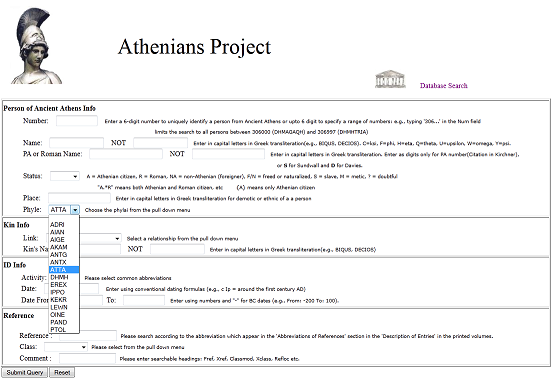
Figure 1: Select Phyle
335 entries are being pulled up from the Beta, Gamma and Delta databases (Figure 2.)
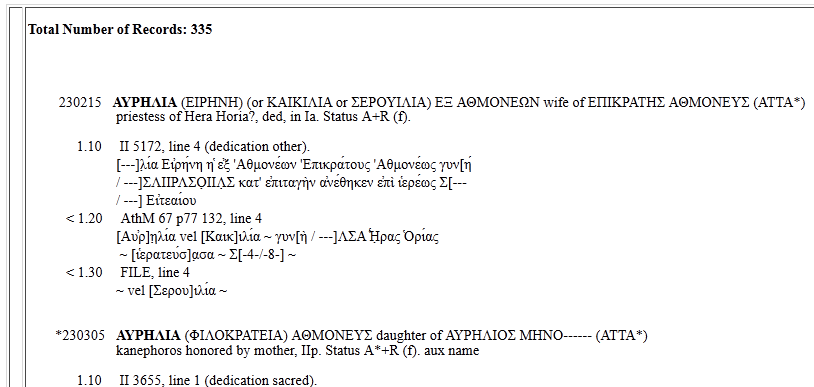
Figure 2: Search Result
But for example if you are interested in looking up an Athenian named Damon, who was a famous Greek musicologist of the fifth century BC and is credited as teacher and advisor of Pericles, a prominent and influential statesman, you can do a search on “DAMON”, using transliterated text “DAMWN” (Figure 3).
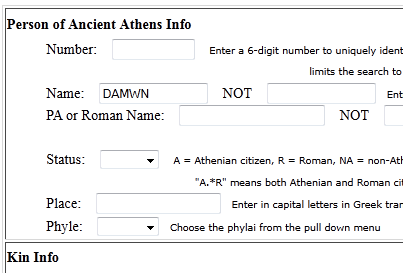
Figure 3: Search Using Criteria Name
The search will turn up 43 entries (Figure 4.)
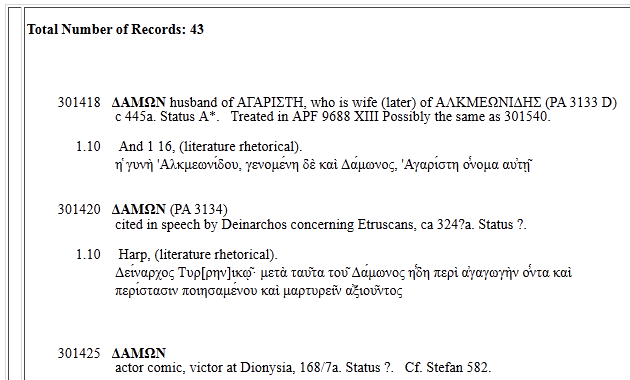
Figure 4: Search Result By Name
A refined search by supplying his Athenian status brought out 23 entries and a further refined search by supplying either the place where DAMON was known from, OITHEN (or transliterated as OHQEN) or his class “Lit Phil” will bring out the exact entry we are looking for as shown in Figure 5.
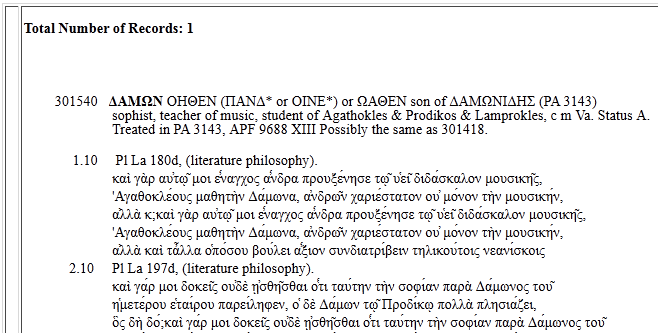
Figure 5: Refined Search Result
Complete web access data on the persons of Ancient Athens will be available in the coming future. Upcoming web access features will include storing and displaying images of stone and images of stone inscriptions on paper compressions (Figure 6.)
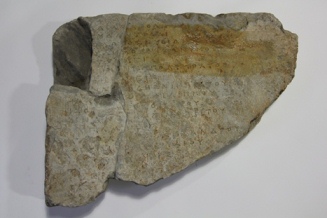
Figure 6: Stone Inscription
and mapping capability to allocate demos and trittys of ancient Athens using Empress spatial index features (Figure 7.)
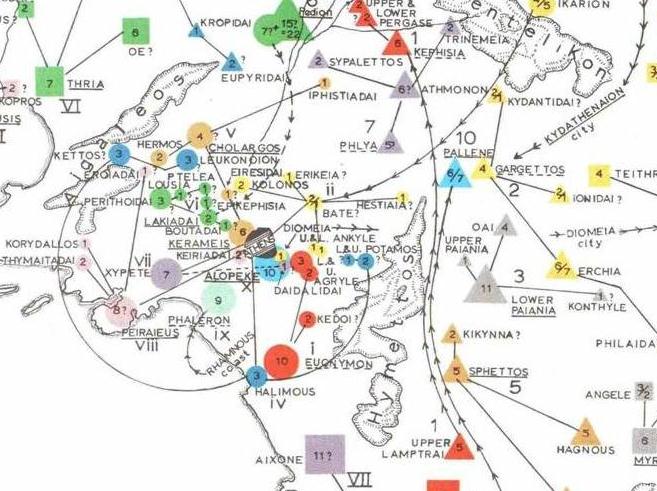
Figure 7: Map of Attica
With the advent of digital information systems, a well designed database and the Internet, the production of making these information available to the general public is no longer confined to the 63 lbs of 20 hardbound printed volumes. Data can now be easily accessed via any web browser, anywhere and on any PC and handheld devices. Data search is now done in mere seconds.
Empress Software Inc
October, 2011
|